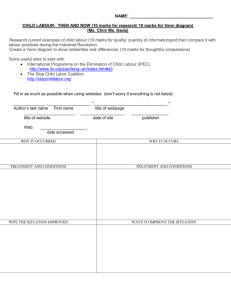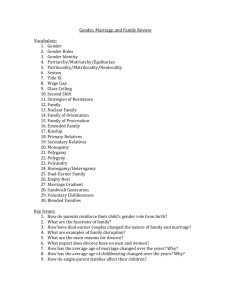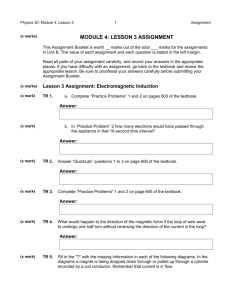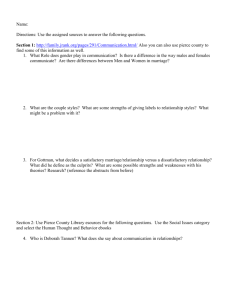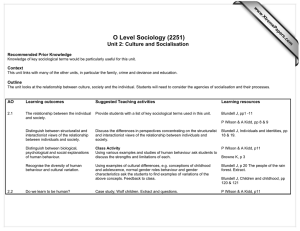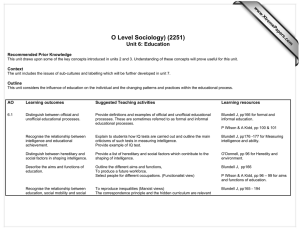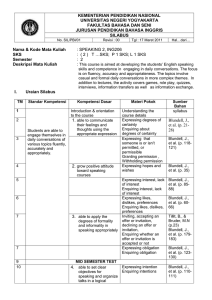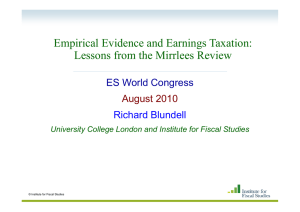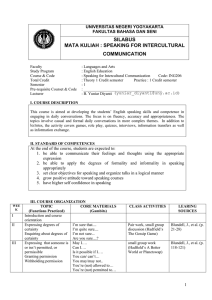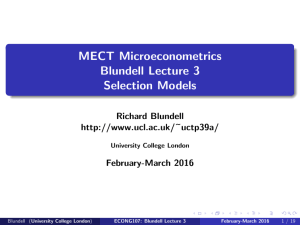The Family Revision Guide
advertisement
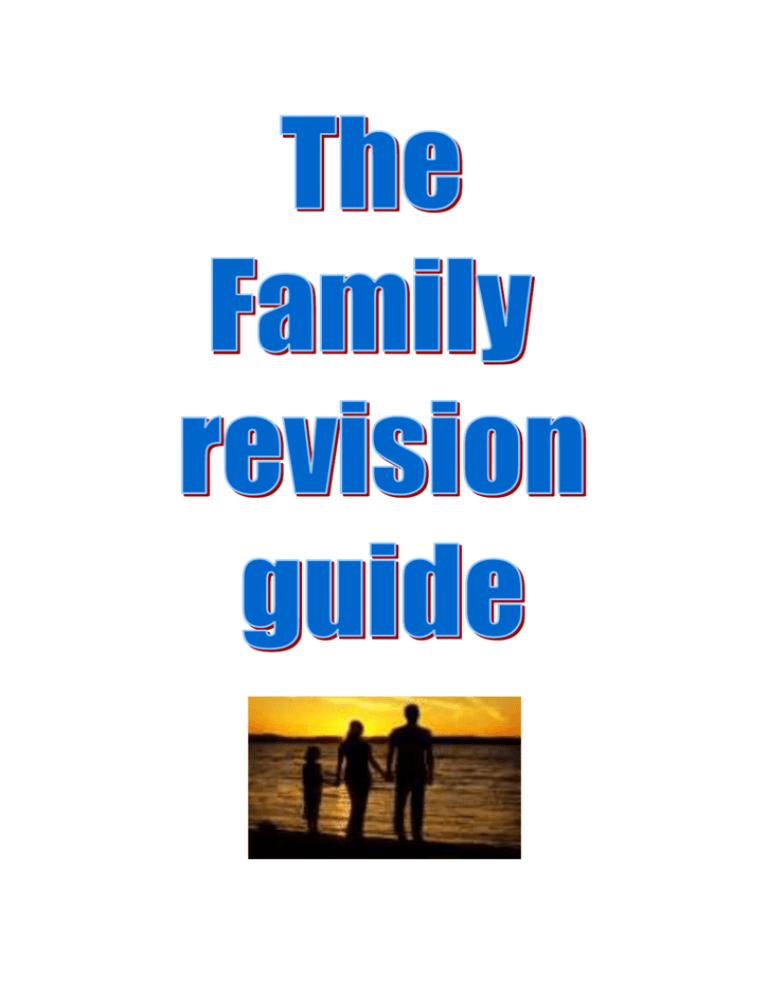
What do I need to know? Difference between a family and a household [ ] Family diversity [ ] Types of marriage [ ] The nuclear family [ ] Domestic division of labour [ ] The family in history [ ] Factors affecting the division of labour [ ] Changes in fertility [ ] Functionalist approach [ ] Marxist approach [ ] Feminist approach [ ] Domestic violence [ ] Patterns of divorce [ ] Patterns of marriage [ ] Parenting and childhood [ ] The difference between a family and a household With a wider range of family forms existing today, sociologist have now grouped them into two types, families and households. Fill in the end of each sentence to show the difference between each. close relatives related through blood. people living in the same house not related through blood. A household means _________________________________________________________________ _________________________________________________________________________________ A family means _____________________________________________________________________ __________________________________________________________________________________ Family diversity Today there are many different forms of families and households in British society. Using pages 134-135, complete the following exercise. Picture of family form Type of family Definition of family Types of marriage Using page 135, fill out the table below to show the different forms of marriages. Picture of marriage type Name of family type Definition of family life The conventional nuclear family Complete the wordsearch below by finding four main features of the nuclear family, finally fill in the hidden message to summarise what the nuclear family is. N I A E N B R S T T F D Z T N D __ __ __ D E M N D B R G Q M L G N M I S T E R D G F H I B J G E N V Y D H L I D S W R E H J K Y I U A I E Y U R L O C C V U S S T D A T N I M E R I L P U U I R N U P F __ __ __ __ __ __ __ __ __ __ __ __ U S D N Q A H E N O Y A P U S G C M A T V P M C N P M H S Q E W L A D C N R K O N U R Y Z T A Y E D A H G V F H M W P X E Z T G A E N I I L N S C P O C X G A N R U D L A C F B E N C K K G I D F P D B D E H D V I K W L A P E __ __ __ __ __ __ __ __ __ __ __ __ __ __ __ __ __ __ __ __ __ A O O D T R J R K V X N P A F Q M U E R G N K Z R M L F T X H I R F P E J A N X V G B G U K P Y __ __ __ __ __ __ __ __ __ __ __ __ __ __ __ __ __ The domestic division of labour Using pages 154-155 in the Blundell textbook fill out the means of the key words associated with the division of labour between husbands and wives. The division of labour means __________________________________________________________ _________________________________________________________________________________ Segregated conjugal role means _______________________________________________________ _________________________________________________________________________________ Joint conjugal role means_____________________________________________________________ __________________________________________________________________________________ Symmetrical family means ____________________________________________________________ __________________________________________________________________________________ New man means ____________________________________________________________________ _________________________________________________________________________________ Now, write a brief paragraph in the bubbles below to show the role of men and women in terms of what they did in the middle of the 19th century and in more recent times (don’t forget to include Wilmott and Young and the feminists). The middle 19th century Modern day The family in history Using pages 148-149 of the Blundell textbook write a short paragraph about what the family was like before the Industrial revolution and after the revolution. Before the industrial revolution After the industrial revolution Perspectives views on the role of the family Unscramble the puzzle below to work out how the functionalist, Marxists and feminists view the role of the family in our society. Domestic violence Using pages 140-141 in the Blundell textbook complete the following exercise. Domestic violence takes three forms p____________________, s____________________ or e___________________. Much of the violence is committed by m_________. Children are seen as w____________ and s________________ than adults and are more at risk of n______________ and i______________. Recently, there has been a concern with the a___________ of m___________. F___________________ see the violence against women and children as the inevitable outcome of m________ d__________________ families. Patterns of divorce Using pages 144-145 from the Blundell textbooks complete the following activity by writing in four reasons for the increasing divorce rate. Patterns of marriage Using pages 142-143 from the Blundell textbooks complete the task below by writing in three reasons why marriage is decreasing. Cohabitation means living together, but not being married. This is increasingly becoming more popular today. In the box below, write to form cohabitation takes. Parenting and childhood Using page 143 in the Blundell textbook write three reasons why couples are having less children today. During the early Industrial period (1750-1850) The relationship between parents and their children has changed over time. During the nineteenth century, children’s experiences and life chances carried significantly according to their age, gender and social class. Middle class children, for example, were often looked after by paid employees such as a nanny. Working-class children, especially boys, were expected to work in paid employment from an early age. Children were employed as cotton mill workers, spinners and weavers, both boys and girls worked. Poverty prevented most parents from sending their children to school, many working-class parents seem to have viewed education as a barrier to their child’s paid employment. Modern day parent-child relationships Today, relationships between parents and children are usually closer and warmer than in the past. As children, we are seen as important members of the family household, are listened to and taken more seriously. There is less emphasis on discipline and more freedom and children’s rights. The family has become smaller, there is now more attention given to individual children. New Laws have been introduced to protect children, they are not allowed to work till 16 and the school leaving age has increased. Younger people are more financially dependent on parents and it has become increasingly more difficult to gain independence from their families. Using the task on the following page, write three ways children were treated and viewed during the early industrial period and in modern-day. Children from the Industrial Period. Modern day parent-child relationships Past papers 2 Study Item B, then answer parts (a) to (d) which follow. Item B (a) According to the information in Item B, was the number of divorces greater in 1976 or in2004? (1 mark) (b) Explain briefly one possible consequence for family members of living in a reconstituted or step family. (2 marks) (c) Identify and explain one reason why more couples today choose to live together rather than marry. (3 marks) (d) To what extent would sociologists agree that changes in social attitudes have been responsible for the increase in the divorce rate since the 1960s? (9 marks) 2 Study Item B, then answer parts (a) to (d) which follow. Item B Type of family Couple with no children Couple with 1 – 2 dependent children Couple with 3 or more dependent children Lone parent 1971 27 1981 26 1991 28 2001 28 26 25 20 19 9 6 5 4 3 5 6 5 (a) According to the information in Item B, what was the trend in the percentage of households made up of couples with 1 – 2 dependent children between 1981 and 2001? (1 mark) (b) Item B shows an increase in the proportion of lone parent households over the period 1971 to 2001. Briefly outline one sociological explanation for this increase. (2 marks) (c) The number of people living on their own has increased over recent years. Identify and explain one reason for this change. (3 marks) (d) To what extent would sociologists agree that the married couple family is no longer the typical family? (9 marks)
